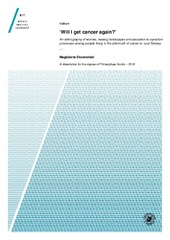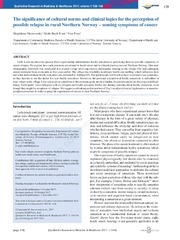| dc.description.abstract | <p>Today, 71% of those who are diagnosed with cancer live five years or longer after treatment. Although the level of mortality varies considerably between different cancer diagnoses, the total number of people who recover after cancer is increasing. There is a need to gain knowledge on how people who live in the aftermath of cancer treatment experience health and illness, bodily sensations, everyday life and relations to the health care system. Several remote municipalities in Northern Norway face challenges regarding the accessibility of specialized health care, which influences the experience of the aftermath of cancer treatment.
<p>This dissertation is part of the overall research project ‘SenCancer - Sensing illness in everyday life: Care-seeking and perception of symptoms among chronic cancer patients’. The main goal of the project was to investigate how people who live in the aftermath of cancer treatment experience bodily sensations, make sense of and act towards cancer illness and health. This involved an exploration of the social processes and relational dimensions of sensations and care-seeking processes.
<p>The study builds upon 11 months of ethnographic fieldwork in 2014 in a rural context, located far off from specialist health care services, more specifically in a coastal village of fewer than 3000 inhabitants in the northernmost county of Norway. Ten people from the village, with different cancer diagnoses and having undergone cancer treatment from three months to ten years earlier, were the core participants in the study. During fieldwork, I took part in the everyday life of participants and in the village in general. The core participants gave monthly semi-structured interviews on experiences of illness and health, treatment, bodily sensations, activities, and relations to family, friends, co-villagers and health care professionals.
<p>The findings of the study are presented in three scientific articles, all published internationally. The articles focus on ways of living, sensing and coping in a small remote village after cancer diagnosis and treatment. They contribute to the understanding of living in the aftermath of cancer treatment in a rural context far away from specialist health care services. The analysis builds upon different analytical approaches to understand social processes of the participants’ bodily sensations, and a) their coping in everyday life in relation to familiar landscapes, b) how they cope with worries of relapse in relations with others, and c) the social and moral embeddedness of bodily sensations.
<p>The study contributes to the theoretical field of ‘medical anthropology of the sensations’, to an anthropological understanding of emotions and to understanding embodied relations to local landscapes when living in the aftermath of cancer diagnosis and treatment.
<p>Article 1: The significance of cultural norms and clinical logics for the perception of possible relapse in rural Northern Norway – sensing symptoms of cancer; Published in ‘Qualitative Research in Medicine & Healthcare’, Vol. 1 (3), 2017.
<p>In this article, we explore how the process from experiencing indeterminate bodily sensations to perceiving them as possible symptoms of cancer relapse is related to clinical logics, and to local values and clinical practice in rural Northern Norway. We show how the high turnover among primary health care staff relates to how and when core participants present indeterminate bodily sensations to shifting GPs. In addition, core participants had certain understandings of what could be presented in a consultation and what is appropriate to ask for from previous experiences with the health care system, and embodied and included clinical routines in their perception and assessment of bodily sensations. The core participants feel that they have to present clear symptoms, so they hesitate to see the doctor for such bodily sensations. Moreover, the personal evaluation of bodily sensations is embedded in local values in the village. Core values are to contribute to the common good, not to be a burden, be positive and avoid focusing on ‘difficult things’. Participants’ inner dialogues with co-villagers and health personnel lead to decisions not to share concerns about bodily sensations which might be symptoms of relapse. We suggest a rethinking and relocation of Hay’s analysis of ‘social legitimation’ in sensationto-symptom processes in order to grasp the experiences of cancer in rural Northern Norway.
<p>Article 2: Approaching Health in Landscapes - An Ethnographic Study with Chronic Cancer Patients from a Coastal Village in Northern Norway; Published in ‘Anthropology in Action’, Vol. 24 (1), 2017.
<p>In this article, we analyze how core participants engage with their familiar surroundings in efforts to counter bad mood, anxiety and symptoms of relapse and to strengthen their health. By drawing on Tim Ingold’s understanding of taskscape, it is suggested that the participants after cancer treatment dwell in and engage with the surroundings of the village in similar ways as before the illness, but after cancer treatment, their core task has changed to coping after illness and staying healthy. The participants are part of and embody the landscape through the temporality of taskscape, related to their ways of dealing with pain, worries and bodily sensations in everyday life.
<p>Article 3: The cancer may come back: experiencing and managing worries of relapse in a North Norwegian village after treatment; Published online in ‘Anthropology & Medicine’, 2018.
<p>Little is known about how people living in the aftermath of cancer experience and manage worries about possible signs of cancer relapse, not only as an individual enterprise but also as a socially embedded challenge. We contemplate human emotions as arising in contexts of interactions, capable of creating social realities. We highlight how people who recover from cancer construct and experience worries about possible relapse in relation to close family members, friends and co-villagers in the socially closely-knit and relatively isolated village. These emotional experiences emerge through relationships with others, have communicative characteristics and take place in interaction with the social environment of their village. While the participants attempt to protect family members by avoiding sharing worries with them, they express the need to share their worries within friendships. They experience both comfort and challenges in managing their worries in relation to acquaintances in the village. The article enhances understanding of the social embeddedness of emotions in everyday life. | en_US |
| dc.relation.haspart | <p>Paper I: Skowronski, M., Risør, M.B. & Foss, N. (2018). The significance of cultural norms and clinical logics for the perception of possible relapse in rural Northern Norway – sensing symptoms of cancer. <i>Qualitative Research in Medicine & Healthcare, 1</i>(3), 138-146. Also available at <a href=https://hdl.handle.net/10037/15044>https://hdl.handle.net/10037/15044</a>.
<p>Paper II: Skowronski, M., Risør, M.B. & Foss, N. (2017). Approaching Health in Landscapes: An Ethnographic Study with Chronic Cancer Patients from a Coastal Village in Northern Norway. Anthropology in Action, 24(1), 27-33. Publisher’s version not available in Munin due to publisher’s restrictions. Publisher’s version available at <a href=https://doi.org/10.3167/aia.2017.240105>https://doi.org/10.3167/aia.2017.240105</a>. Accepted manuscript version available at <a href=https://hdl.handle.net/10037/13404>https://hdl.handle.net/10037/13404</a>.
<p>Paper III: Skowronski, M., Risør, M.B., Andersen, R.S. & Foss, N. (2018). The cancer may come back: experiencing and managing worries of relapse in a North Norwegian village after treatment. Anthropology & Medicine. Publisher’s version not available in Munin due to publisher’s restrictions. Publisher’s version available at <a href=https://doi.org/10.1080/13648470.2017.1391172>https://doi.org/10.1080/13648470.2017.1391172</a>. Accepted manuscript version available at <a href=https://hdl.handle.net/10037/14618>https://hdl.handle.net/10037/14618</a>. | |


 English
English norsk
norsk
